
You are reading:

You are reading:
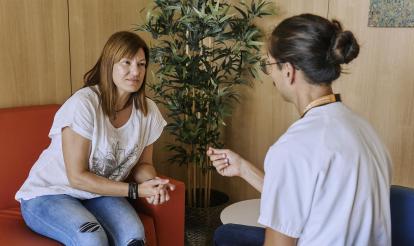
When Rosa’s mother Antonia’s cancer was no longer responding to treatment, the social worker offered them psychological help. Darío, a psychologist from the ”la Caixa” Foundation’s Comprehensive care for people with advanced diseases programme, accompanied them during the last phase of Antonia’s life and, after her passing, during Rosa’s mourning.
Rosa speaks of the illness and death of her mother, Antonia, with great simplicity: “They discovered her cancer shortly before the pandemic, and it dragged on for three years. When she was about to finish the first course of chemotherapy, they discovered that she had brain metastases. They tried a second treatment, but it didn’t work. After a while they told us that it wasn’t worth continuing because my mother wouldn’t have more quality of life. It was a very difficult moment, as you can imagine, and the worker offered us psychological counselling. That’s when Darío came into the picture.”
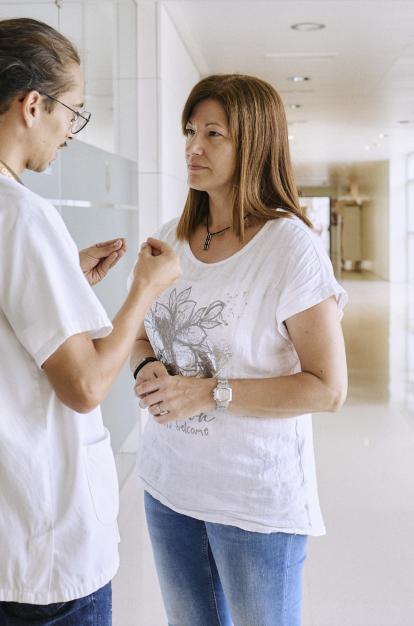
Darío is one of the psychologists in the Comprehensive care for people with advanced diseases programme. This programme includes the psychosocial care teams (EAPS), made up of various professionals, including psychologists, who work with patients with advanced illnesses and their families. At such hard and difficult times, it is essential that physical as well as psychological, social and spiritual needs are met. “When they told us that my mother was going to die, I was least worried about the medical part because I work as a nursing technician. I knew how to take care of my mother. Twelve years ago, when my father died of cancer, he was perfectly cared for, but at that time there was no psychological care, and I’ve been able to see the difference between having it and not. Both for my mother and for me, Darío’s presence has been fundamental. Although it was a time of great sadness, he managed to make it a beautiful experience. My mother adored him and I’m very grateful to him. We were able to say goodbye in peace. Sad, but in peace.”
Psychologists like Darío provide services to people in palliative care and their families, both in the months before death and in the grief that follows. Darío says it’s difficult work, but rewarding. “We work with the patient and their family to reduce the suffering that comes with facing a terminal illness. We intervene in one of the most important moments of life, the end of the biography. In a way, we’re privileged because working with death allows us to understand life better.”
“My mother was a very strong person,” says Rosa. “Even when she was ill, she taught us lessons about life and death. She faced her own death calmly, without fear. Having seen how she passed away, I’m not afraid of death. As she said herself, I’m afraid of suffering, of a long agony... but not of dying. When you’ve done everything you have to do and you’ve been able to say goodbye, there’s nothing to fear. Darío told us that he himself had learned from her, and that there are few cases like this.”
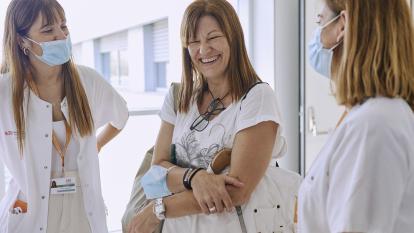
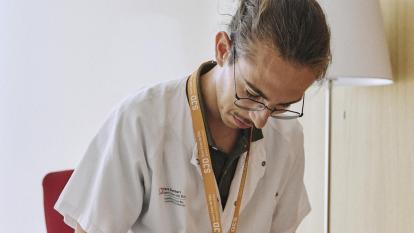
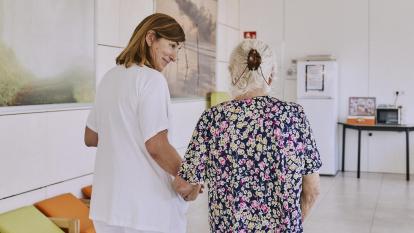
Dario confirms that Antonia is a special case. He was able to accompany her and her children throughout the whole process: the diagnosis of an incurable disease, coping with oncological treatments, the progression of the disease and the adjustment of treatments, the end-of-life situation and sedation, and now the mourning process of her relatives. “Every moment requires a treatment. It’s important to individualise our intervention. In Antonia’s case, I witnessed a beautiful transformation. Although she had some difficulties in sharing her feelings with her daughter and primary caregiver, Rosa, she managed to resolve unfinished business and face death without fear. She had an end of life characterised by permission, serenity and acceptance.”
Rosa says she has always been very proud of her mother. “My parents did not have an easy life, but they gave me and my siblings an excellent education. We can go anywhere with our heads held high. I take my hat off to that upbringing, but we lacked a bit of affection. That was something that was bothering me and, thanks to Darío, I was able to talk about it calmly with my mother. I was able to raise it with her without it seeming like an attack, more like a question. I wouldn’t have known how to do it on my own, and Darío knew how to find a way.”
“I’m left with a bittersweet feeling,” Rosa concludes. “We were very close to my mother during the last months of her life. It’s a pity that I didn’t get to enjoy her more, but I’m happy to have said goodbye to her in peace.”
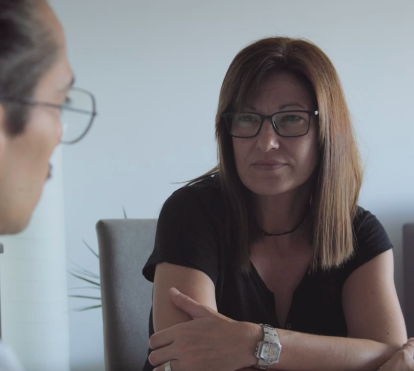
Rosa and Darío’s story is part of the documentary project Life stories, 14 stories of overcoming adversity which gives a voice to people at risk of exclusion who share their experiences in order to raise public awareness.